- Home
- Marilyn French
Our Father Page 2
Our Father Read online
Page 2
Alex looked stupid.
“The Office of Management and Budget. A government agency that sets the country’s economic policies.”
Alex had the look of a seventh-grader trying hard to memorize a Latin declension.
“You do know that I am an assistant secretary of the treasury, don’t you? We just don’t count the money, Alex, we set the nation’s economic policy.”
She doesn’t know that I don’t even know what that means. What is an economic policy anyway? Don’t ask. “And you and Clare were married?” she said sympathetically.
“They were … very good friends,” Mary explained.
“My best friend in the world,” Elizabeth murmured.
“I’m so sorry,” Alex breathed. “What did he die of?”
“Pneumonia.”
“Oh,” Alex said mournfully. “How old was he?”
“Pneumonia?!” Mary exclaimed doubtfully.
“Seventy,” Elizabeth said. “A young seventy.” She lighted a cigarette. “It’s what happens in middle age, people start dying,” she said brusquely. “We can expect to hear news like that daily. Death and sickness, loss on all sides. That’s all we have to look forward to.”
“Oh, Elizabeth, you’re always so negative!” Mary snapped. “I definitely don’t feel that all I have to look forward to is death and loss!”
“No, you’re probably looking forward to another husband.”
“I certainly am. And why not! You’re just as nasty as ever!”
A long silence fouled the air like musty cigar smoke.
Alex stood abruptly. “Another drink, anyone?” she chirped, walking to the small sideboard and refilling her wineglass. She turned, began tentatively, “Do you remember me at all? I mean, I remember you both, but very—vaguely—I guess. You seemed so grown up to me. I remember your wedding,” she said to Mary. “So grand! The striped tent and the men all in cutaways and crystal stemware on the tables and all the flowers, flowers everywhere! You had six maids of honor and six ushers. You were so beautiful, like a movie star, I thought you were a goddess!”
Mary sat silent. Elizabeth went to England, left me here alone. Desolate. “Yes,” she said finally. “That was 1955. I married Harry Burnside. You were my flower girl. You wore pale pink and carried pink lilac flown in from Canada.”
Faraway voice, remembering. “Nineteen fifty-five: I would have been seven, eight that Christmas. I still have that dress, anyway Mom has it in the attic, I saw it a few years ago when I went up to look for a steamer trunk for Stevie when he was going to camp. But I don’t remember Harry.”
“He died. In 1960.”
“I remember he was much older than you.”
Elizabeth grinned nastily. “Same age as her daddy.”
Mary shot her a look but Alex was staring upward, remembering something, exclaiming, “Didn’t you marry somebody famous? I remember my mother reading about you out loud from the papers one day. Much later.”
“Probably Alberto. Alberto di Cenci. That made all the papers. He was famous for being gorgeous, rich, and a playboy, nothing else. He never did anything!”
“He really got famous,” Elizabeth drawled, “when he left you for Nina Newton.”
“The movie star?” Alex exclaimed excitedly. “I remember her! I’ve seen her old movies on TV.” She glanced at Mary’s face. “She must be very old by now,” she added quickly.
“She must be very dead by now the way she hit the booze and drugs,” Mary snapped. “She lived on a cocaine circuit even then. Cocaine was the drug of choice for high society for decades.”
“For the Eurotrash set, anyway,” Elizabeth added primly.
“You were well out of that, then,” Alex said warmly.
Elizabeth smirked at Mary. The room was silent.
Alex tried again. “Oh, I envied you both—so beautiful and grown up and you had each other and this wonderful house. You”—she turned to Mary—“used to come to Father’s house in Georgetown, but you”—she turned to Elizabeth—“never did. Why was that?”
“My mother was dead,” Mary said shortly. “I had no place else to go on school holidays. I had to stay with Father—at Georgetown at Christmas and Thanksgiving and Easter, and here summers.”
Alex frowned, pushing her memory. “Did you have a white room? All white?”
Mary nodded.
“But you never came there?” she asked Elizabeth.
“My mother was divorced from Father, she was alive, she still is. I lived with her. He had custody of me summers, so every summer I had to come to Lincoln. The rest of the time I lived with my mother in Boston,” she said emotionlessly.
“Oh!” Alex breathed out deeply, as if these bits of knowledge appeased some hunger. Her voice reached out to them, heated, urgent. “My mother—Amelia—you knew her, didn’t you? Yes. Well, she remarried, a sweet guy but they never had children of their own. I think Charlie was … well, I know she would have liked to so I guess he couldn’t. I mean, it couldn’t have been her. Could it. I mean, she’d had me.”
“Oh, right,” Elizabeth said in a mocking voice. “I mean, right on, I mean.”
It went right past Alex. “And I used to wish, oh, I wanted sisters so badly, I thought about you two all the time. I’d think about where you were and what you were doing, I’d beg my mother to invite you to visit us. But she’d always have some excuse: you were grown up and far away, you had children of your own to take care of”—she addressed Mary—“or you were living in France or Switzerland.” She turned to Elizabeth. “You had some important government job and couldn’t leave.” She paused. “I used to wonder how she knew about you but somehow I never got to ask questions about you beyond that. She’d always hug me or try to distract me. I came to recognize this tactic,” Alex laughed.
The others gazed at her.
“Fuck sisters,” Elizabeth said. “Consider yourself lucky. You had a mother who hugged you.”
“Consider yourself lucky you had a mother,” Mary said coldly.
Alex lay in bed, the drapes and curtains pulled open, looking out at stars. I finally find them, am finally in the same house with them and I might just as well be in Newark, Delaware. Her eyes filled. Would it have been different if I’d found them years ago, if they’d visited me, if I were allowed to visit them? Why weren’t we? Of course, they’re so much older, and with different mothers. … Oh, why do I care so much about them when they don’t care about me at all?
Oh they didn’t want to talk or maybe they didn’t want to talk to me it’s just like Mom, why won’t anyone tell me when there’s so much I want to know, need to know, why do I need to? but I do, I do, I want to know everything about them, him, their lives. My family. They are my family, aren’t they? Alex put her hand over her heart, which seemed to hurt, and rubbed it gently. I wonder if it’s really in your heart that you feel things. There are people in the world who think feelings reside in their stomachs or their livers. Do we feel things in our hearts just because we’ve been told that’s where we feel? Who was it told me that if a chimpanzee suffers a terrible loss, like its mother dies or something, when it dies and they cut it open, they find lesions on its heart? Could that be true?
Pain suffused her body, and she turned on her side.
Back here again. Haven’t slept in this house since I was nine. Twenty-seven years ago. Glorious then, the trees a mist of green, the gardens glowing, the house so luxurious, so much room. The Georgetown house was more crowded. I think. The Baltimore house sure was, she smiled. This house looks different now, like grade school if you go back after you’re grown up, corridor walls crowd in on you, things that looked huge then look dwindled, little. Am I remembering wrong? Idealizing? Elizabeth was so tall and she knew everything, sometimes she read to me or pretended to play tennis with me. A few times the three of us went for walks, Mary was so fun, teasing, playing tag, she taught me to swim. Mommy would have lemonade and cookies served on the screened porch every afternoon for all of us. Some
times Daddy would come too and sit with us, hold me on his lap, stroke my hair. I remember that! He did do that! And he bought me a puppy, called it Charlie Chaplin, then everything seemed to stop all of a sudden. We went to live with Grandma and Grandpa. I remember Momma’s lips tight, Grandma and Grandpa so pale, hardly speaking. Everyone treating me as if I was sick. Then later Momma married Charlie … we went on living in the little rowhouse in Baltimore.
Yes, fits I had. Some kind of fits. Maybe I was sick. Maybe that’s why Momma won’t tell me. Maybe I have some congenital incurable disease that won’t show up for another year or two. Some horrible degenerative thing that will wither my limbs, make my hair fall out, something that runs in Father’s family that he didn’t tell her and that was why. … Oh that’s crazy. The others are healthy enough and they’re not young. Elizabeth is in her fifties.
Eighteen years since I last saw Father. Suppose he never speaks again or hears or is conscious again I’ll never be able to tell him … he’ll never tell me … I’ll never find out. Did he hate me? Why did he abandon me? He didn’t abandon them. Mom could tell me, why won’t she? Why is there this empty place in my memory? Maybe there’s nothing to tell. That would be worst of all. Nothing happened at all. Just a couple splitting up. But Momma’s so sweet, why would anyone want to leave her? He was a run-around, I guess, but he never married again after Momma. But it was Noradia, the housekeeper, he was sleeping with her, that’s what all the business was about with Ronnie. She must be his child, look at her eyes, her mouth. But Noradia can’t have been responsible for their splitting, was she even here then?
Something happened. No one will tell me.
They despise me, why do they despise me?
She tossed in the bed.
They don’t want me here, I won’t stay, I’ll go home as soon as I can. She turned onto her other side, burrowed into the mattress, tried to sleep. It must have been the starlight that bothered her, that seemed to penetrate her closed lids. It was not moonlight, the moon was gone, sunk on the other side of the house. The insides of her eyelids were punctured by tiny brilliant lights.
Elizabeth removed her contact lenses by feel, not looking in the mirror. She laid them in a tiny box, and poured liquid over them. Then she undressed systematically, carefully avoiding the mirror. Does Ronnie know something? Is it possible he left everything to her mother? Noradia could have worked on him these last years, he was totally dependent on her. She had to hate us, she must have wanted to see her daughter taken care of. She could have got him to change the will and told Ronnie. Her face when she said that. Triumphant.
She stripped slowly, peeling away the layers that disguised the thinness of her body—jacket, sweater, belt, silk blouse, chemise, skirt, pantyhose, underpants—and stepped into the hot shower.
Never, she decided, as the hot needles hit her flesh. He was an Upton, Uptons value blood. Only blood and the name. For generations. Stephen Upton: the name passed from father to son. We were not sons. She paused in her washing, then decided: no. He never even acknowledged her. She has his eyes, like me, but she has his mouth too, the only one of us with his mouth, his eyes and mouth in a round brownskinned peasant-face stocky-body chicana. Shameful. He had to see, had to know everyone could see, treated her like the servant’s daughter she was while looking into his own eyes. Did he care?
She slid into a terry robe, put a towel around her head and padded barefoot into the bedroom, her bedroom, kept for her all these years. She lighted a cigarette. She had not slept in it in what … two years. His eightieth birthday. Maybe he was lonely, hard to imagine, he who never needed anyone. He was only in his fifties when Noradia first came to work here, still in the cabinet, he could easily have married again, then or even later, lots of men do, marry women twenty thirty years younger. God knows he dated every eligible society broad going, his name always in the columns linked with some glamorous Washington hostess or other. But he said he hated women. Spat the words, said he’d had it with marriage after Amelia. Wonder why he left her. Alex doesn’t know either. Bothers her. Well that’s one problem I don’t have.
She rubbed her head vigorously with the towel, then combed out her thin hair, still without looking into a mirror. Probably got worn down by desire hate need revenge, god the passions marriage generates, Mother so bitter still, forty years later is it forty, it’s 1984, no, fifty, Jesus! And still gets that look on her face when she talks about him, hatred unto death even after death, she’ll never be reconciled, well who can blame her after all. I’m lucky I never got into that morass, just as well.
Still even if you don’t get married, if you have affairs, any relationship, one way or another you get worn down. Her eyes smarted, she wiped her hand across them and caught sight of her face in the mirror, her father’s face, long narrow nose of a hawk. If he had married again, he might have had another child, another legitimate sibling. Estate split four ways instead of three. If it had been a boy we’d be disinherited, we’d get a nice little annuity. For sure. Better this way. But his eyes in that little thug: shameful.
By-blow, that’s what they call them. As if a man did something with his left hand, swatted a fly, by-blow, meaningless. Does she think she’s entitled to make decisions with us, be part of the family council? Why is she here? Of course, she came for her mother: Noradia dies, Father has a stroke or whatever he had. Maybe he loved her. He was dependent on her. Same thing. Her eyes burned again and this time she did not touch them, lying back against the pillow of the still made-up bed. A single tear ran down her left cheek.
Have to search his study, his papers, the will must be around somewhere, in the safe maybe, do I know the combination? Did I ever know it? Where would he keep it? Too tired to look tonight: got home so late last night, then had to pack, of course an eight-thirty meeting this morning. Seeing Mary again. … Always exhausting seeing her having to listen to her. And that Alex, my god, she’s even worse than Mary: incredible.
Tomorrow I’ll do a thorough search.
I would have liked to talk this over with Clare. He’d have said, “All these bits and pieces, darling, how can I sort them out? Love and desire and hate and jealousy and need and dependency, just words. They tear into a fabric that’s like spiderweb in delicacy and strength—you know the African proverb—a spider’s web can halt a lion—well, it halts me, darling.” He would have laughed and made us fresh martinis and kissed me on the forehead and said “Let’s talk about what we’re going to say at the Council tomorrow,” and we would have gotten off on that, both excited, laying down a game plan, and then, then he could talk about manipulation and dependency and psychological tactics. Then he could talk about power. And when he left I would feel high on all of it sailing on it tactics and strategies plugging into other people’s weaknesses vulnerabilities got to keep your own hidden and by the time I got into bed I would have forgotten my own. Kept me high. Clare.
Mary folded her silk blouse slowly, over and over, until it was a tube, then let go and a swathe of white silk shot with gold fell across her knees. Hard to be in this room, in this house. Hard to be with Elizabeth. That stupid gushing Alex. Unbearable. And the little bastard. Does she expect us to treat her as an equal? With her manners? Feet up on the cushion with her shoes on, sneakers, for heaven’s sake, drinking Coke out of a can. Walks like a boy, dresses like a boy, that might be forgivable but she looks like a poor boy, dirty jeans, ragged sweatshirt. If she came to the dinner table dressed like that, no wonder Father didn’t speak to her. Surprised he didn’t lay down the law. That morning I ran downstairs in my pajamas, ran to Mama, something had happened, what was it? I must have cut or banged myself, I was crying. Father stormed: Uptons do not appear downstairs in their nightwear or bathrobes! He was so stern I cried harder and Mama had Nanny carry me back upstairs. Which nanny was that? Nanny Annie, I loved her, I called her Annie Nanny, how I cried when she left. … Got married. “Annie is going to get married and have a little girl just like Mary!” she said. Another Mary supp
lanting me! I was horrified, I just screamed louder. No, it must have been Nanny Gudge because she scolded “Pas en déshabillé!” Nanny Gudge always spoke French, why Mama liked her even though she used to slap me.
The house will have to be sold, none of us can afford to keep it up, it’s from another age, needs a regiment of servants to maintain it, half closed up as it is, only our bedrooms open. Who’d buy it though, who’d want it? stuck out here in Lincoln, miles from anywhere. Suppose we can’t sell! Everything shabby, the dining room chandelier is filthy, Noradia really wasn’t doing her job, maybe she’d been sick longer than they knew, well she could have said something, should have, he could have gotten someone else, I suppose that’s what she was afraid of, being tossed out sick on her ear in her old age, the tennis court cracked and grassy, the pool a scummy bog. Maybe someone will want it because it’s the house of a great man. But he could hang on for months. Years.
She rose and finished undressing. She did not look in the mirror until she had slipped the satin nightgown over her head. Then she moved in close, studied her image, moved back, lifted her chin. She took her beauty for granted, examining her face as a workman might his tools. She slipped her feet into high-heeled satin mules, teetered into the bathroom and began her nightly regimen. Brush, floss, Water Pik, face makeup remover, eye makeup remover, cleansing cream, toner, night cream, neck cream, eye cream, hand cream. She brushed her hair, still dark and glossy with a little help from Antoine. The face is still good, she thought, unconsciously raising her neck to view it again. Even without makeup. Still beautiful. That little eye job had helped enormously. Only the body … Still, men like voluptuous women, whatever the fashions.
She walked totteringly back to the bedroom, surveyed it, sighed. All white: the only way she could really rest. Hotels she’d stay at often had kept a room like that for her through all her husbands, vôtre chambre, Mme Burnside, Mme di Cenci, Mme Armonk. Didn’t travel much with Don. At home, her bed and chaise were heaped with lace-covered pillows, the lace bedcover, the cloth on the little table, everything white. White furniture. Handmade lace curtains like the ones here, no machine-made abortions for her.

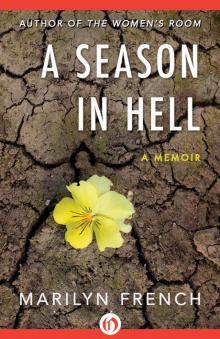 A Season in Hell
A Season in Hell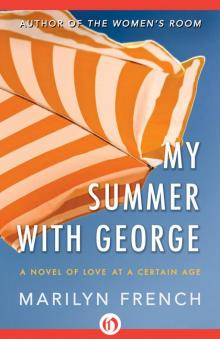 My Summer With George
My Summer With George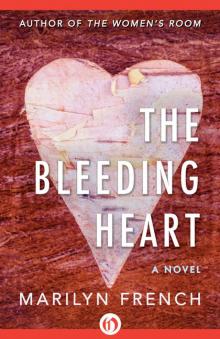 The Bleeding Heart
The Bleeding Heart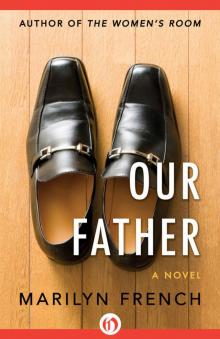 Our Father
Our Father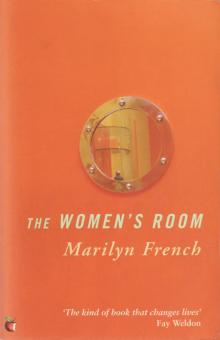 The Women's Room
The Women's Room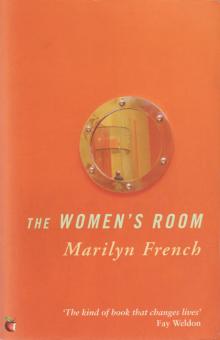 The Women's Room (Virago Modern Classics)
The Women's Room (Virago Modern Classics)